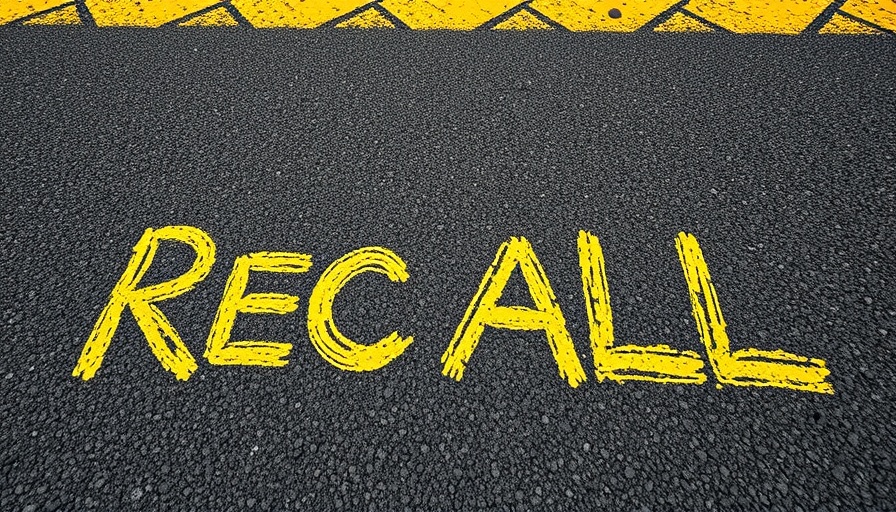
Transforming Recalls into Retention: A Strategic Approach
With an estimated 70 million vehicles on the road with open recalls, the automotive industry faces a critical challenge. Recalls present not only safety risks but also significant operational hurdles for dealerships. Yet, rather than viewing recalls solely as a nuisance, dealerships possess a unique opportunity to cultivate stronger customer relationships and drive revenue through optimized recall management.
Understanding the Recall Landscape
In 2024, over 450 separate recall campaigns affected millions of vehicles in the U.S. However, only about 75% of vehicles get repaired following a recall. With such a disappointing compliance rate, the automotive industry needs an overhaul in its approach to recalls to regain consumer trust and satisfaction.
New technologies allow dealerships to automate and personalize outreach for recalls, simplifying communication and ensuring customers are informed about necessary repairs. AI-driven tools can analyze vehicle data rapidly, allowing dealerships to identify which vehicles are flagged for recall and reaching out judiciously.
Building Trust Through Effective Communication
Trust is paramount in the dealership-customer relationship. As highlighted in a recent study by Deloitte, 71% of consumers rank trust as a pivotal factor when selecting a dealership. By streamlining their communication processes about recalls, dealerships can position themselves as reliable partners. Proactive outreach that includes detailed repair timelines and costs, along with personalized communication strategies, can help in building a loyal customer base.
For example, companies like Recall Masters offer specialized platforms that help dealerships send targeted notifications to vehicle owners, increasing the chances that customers will respond positively to recalls. Personalization not only enhances engagement but also nurtures long-term loyalty.
Maximizing Recall Opportunities
Recalls should be seen as an entry point for services rather than mere obligations. When customers come in for recall repairs, dealerships have a chance to assess their vehicles further. According to research from J.D. Power, customers who show up for recall repairs are likely to return for routine maintenance, with over 54% spending on additional services during their visit. By providing complimentary vehicle checks, dealerships can effectively upsell necessary services without being overly aggressive, creating a win-win situation for both parties.
Leveraging Technology for Efficiency
With the rise of smart technology, such as automated scheduling and data analytics, dealerships can manage recall workflows more efficiently. A study found that as many as 15% of recalls remain unresolved simply due to scheduling issues. By offering multiple scheduling options, including online and mobile integration, dealerships can eliminate barriers to repair compliance, thus improving customer satisfaction.
Moreover, using analytics to track customer interactions with recall notifications can help dealerships refine their future communication strategies and better predict service needs. This data-driven approach can ultimately lead to higher completion rates, enhancing both customer retention and revenue.
Turning Challenges into Opportunities
While the path to effectively managing recalls can be fraught with challenges—such as limited awareness among vehicle owners—dealerships can use innovative communication channels. By leveraging social media, email, and SMS notifications, they can increase awareness significantly. Vehicle owners who feel informed are more likely to act promptly, transforming recalls from potential inconveniences into valuable service opportunities.
Additionally, dealerships should consider offering flexible repair options, such as mobile service units or loaner vehicles, to alleviate customer concerns about inconvenience. By addressing these needs, dealers can enhance the recall service experience, encouraging compliance and boosting customer satisfaction.
Conclusion: A Forward-Thinking Approach to Recalls
In conclusion, the automotive industry's approach to recalls should evolve from an obligation to a customer-retention strategy. With approximately one in four cars recalled, the potential for dealers to turn a challenging situation into a thriving relationship is immense. By focusing on proactive communication, utilizing technology for efficiency, and emphasizing customer convenience, dealerships can bridge the gap between service and loyalty, ensuring that they are the dealership of choice, not just for recalls but for future sales and services.
To enhance your dealership’s recall process and ensure optimum customer retention, consider implementing efficient systems that streamline recall management and improve customer engagement. Every recall is an opportunity—leverage it wisely.
 Add Row
Add Row  Add
Add 


Write A Comment